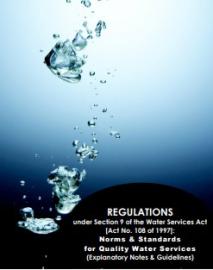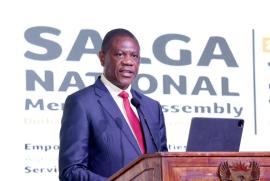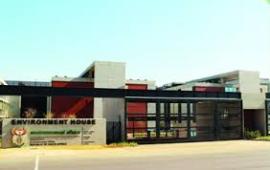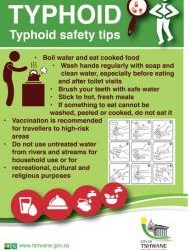As part of ongoing efforts to strengthen national regulatory framework for water and sanitation, the Department of Water and Sanitation (DWS) is set to host a series of workshops on the Revised Compulsory National Water and Sanitation Services Norms and Standards.
The updated standards aim to set clear, enforceable minimum requirements for safe and reliable water supply and sanitation services, in line with public health priorities, environmental sustainability, and the constitutional rights of all South Africans.
Under the revised regulations, all Water Services Authorities (WSAs) are now legally required to provide basic water supply services to every household within their jurisdiction. This includes delivering at least 6 kilolitres of safe drinking water per household per month, ensuring availability for at least 358 days per year, and maintaining a flow rate of no less than 10 litres per minute.
Spokesperson at the DWS, Wisane Mavasa highlighted that the standards also ensure that indigent households receive this allocation free of charge, with tariffs applied only for excess usage.
The WSAs are also mandated to maintain infrastructure up to the user connection point, while property owners are responsible for any infrastructure beyond that boundary.
“Special attention is also required for informal settlements, where WSAs are obligated to provide interim water supply services within 90 days of discovery.
“These services must include communal standpipes located no more than 200 meters from households and maintain the same minimum water quantity, flow rate, and quality standards as formal settlements,” Mavasa said.
Water quality must conform to the South African National Standard (SANS) 241, safeguarding public health consistently.
In addition to supply, the revised standards place strong emphasis on service monitoring and management.
“Water services must be metred accurately, with WSAs responsible for meter maintenance, repair, and replacement within set timeframes. Educational initiatives on water use, hygiene, and groundwater management are integral to service delivery.
“WSAs are also required to formally plan and submit their strategies for upgrading all households to basic services within two years of these regulations’ promulgation,” Mavasa said.
The Water and Sanitation Norms and Standards were first gazetted in 2001, per the Water Services Act, Act 108 of 1997. These regulations establish mandatory national standards and measures for water conservation, covering basic sanitation, water supply, service interruptions, potable water quality, and leak repair, among many other water services-related matters.
The regulation was reviewed in 2017, with published norms and standards based on the 1998 National Water Act (NWA), the 1997 Water Services Act (WSA), and the 2016 Sanitation Policy. The revised Norms and Standards were gazetted on 6 June 2025 for implementation.
Consultations
The rollout workshops will commence with a national virtual consultation on Tuesday, 5 August 2025, followed by provincial consultations, scheduled from 12 August to 10 September 2025.
“The rollout aims to ensure that the Norms and Standards are widely understood, accepted, and implemented. The workshops enable the WSAs to assess their ability to comply with the revised provisions,” Mavasa said.
In instances where immediate compliance is not feasible, Mavasa said WSAs must develop and submit a progressive implementation plan detailing the steps and timelines for achieving full compliance.
These plans must be submitted to the Integrated Regulatory Information Management System (IRIS) for consideration and approval by the DWS within six months of the regulation’s publication.
Affected stakeholders, including government departments, Chapter 9 institutions, water boards, Catchment Management Agencies, and professional bodies, will also have opportunities to engage on the Norms and Standards. – SAnews.gov.za
















